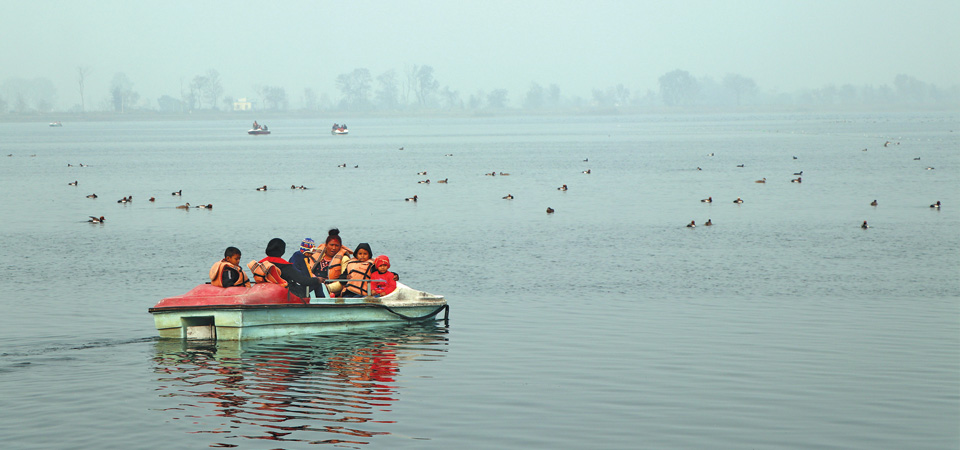Overexploitation putting wetlands in crisis

By Janu Pandey
Kapilvastu, Feb. 7: Wetlands, which play a crucial role in protecting the ecological balance and biodiversity, are said to be in crisis due to human activities.
Covering about five per cent of Nepal's land area, they are in crisis due to over-exploitation, lack of protection efforts and human encroachment.
The impact of growing human activities around Jagadishpur Lake of Kapilvastu, which is listed in the World Wetlands Area, has started appearing in the recent years. On the occasion of the 26th World Wetlands Day and the 9th Bird Day at Jagadishpur Lake recently, the speakers stressed the need for the government and the community to take initiative in wetland conservation.
Minister for Physical Infrastructure Development in Lumbini Sahasram Yadav urged the Lumbini Province government to prepare a plan for the protection of the wetland area.
Chief of the Division Forest Office, Kapilvastu, Bijay Raj Subedi, said that the problem was due to the dumping of garbage in the wetland area. “Now the wetlands are being destroyed in different ways. One of them is a practice of cultivation by removing and drying up the wetlands,” he said.
In recent days, paddy planting has started in the wetland areas of the district. When garbage is dumped in the wetland, the collection of harmful material there affects the wetland-dependent animals, Subedi said.
Bhupal Nepali, an official of the Bird Conservation Nepal, claimed that the number of birds has been declining due to human activities in Jagdishpur Lake. According to the census, the number of birds in the lake has been decreasing with every passing year.
In Jagdishpur Lake, 14,980 birds were counted in 2019; 20,800 in 2020; and 12,063 in 2021. But this year, around 13,000 birds have been counted, Nepali informed.
The number of birds is in decline due to human activities, including poaching, obstruction of breeding activities, and habitat loss. The wetland is shrinking due to encroachment.
Biologist Dilip Chand attributed the problem in the biodiversity of the wetland area to the use of chemical fertilizers and pesticides during the cultivation process.
Although wetlands are critically important from biological, social, environmental, tourism and economic point of view, they are being affected due to misunderstanding between the community and the government.
The Government of Nepal has adopted a policy of conservation and management of wetland by enacting Nepal Wetland Policy 2069.
Recent News

Do not make expressions casting dout on election: EC
14 Apr, 2022
CM Bhatta says may New Year 2079 BS inspire positive thinking
14 Apr, 2022
Three new cases, 44 recoveries in 24 hours
14 Apr, 2022
689 climbers of 84 teams so far acquire permits for climbing various peaks this spring season
14 Apr, 2022
How the rising cost of living crisis is impacting Nepal
14 Apr, 2022
US military confirms an interstellar meteor collided with Earth
14 Apr, 2022
Valneva Covid vaccine approved for use in UK
14 Apr, 2022
Chair Prachanda highlights need of unity among Maoist, Communist forces
14 Apr, 2022
Ranbir Kapoor and Alia Bhatt: Bollywood toasts star couple on wedding
14 Apr, 2022
President Bhandari confers decorations (Photo Feature)
14 Apr, 2022











